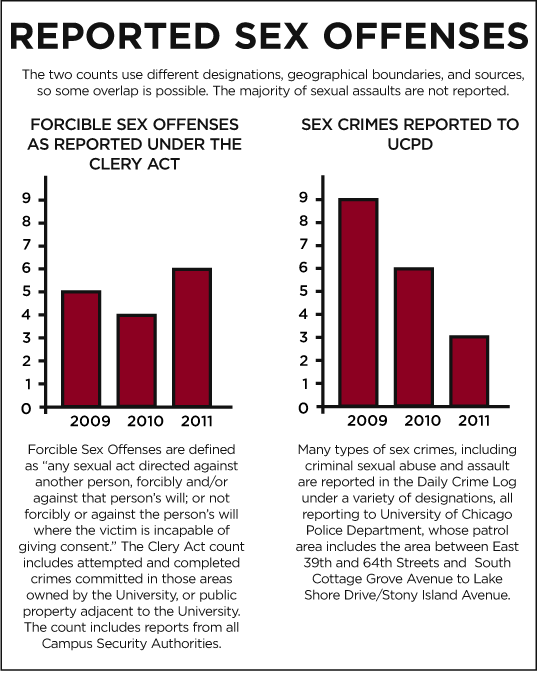This is the fifth installment of a quarter-long series on sexual assault, the fourth of which was published on November 20. It can be found here. The sixth and final installment was published on December 4 and can be found here.
Every fall, the University, in its “Common Sense” guide, publishes crime statistics from the three previous calendar years, including sexual assaults. This information, along with Daily Crime Logs, is published in accordance with the Jeanne Clery Disclosure of Campus Security Policy and Campus Crime Statistics Act (Clery Act). A combination of factors, from the underreported nature of sexual offenses, to the Act’s exclusion of student apartment incidents, means that the Clery count represents only a fraction of the sexual assaults at UChicago. Local violent crime statistics supplement the University’s federal reporting requirements. Even with this addition, the picture of sexual assault at UChicago remains incomplete.
The Clery Act is over 20 years old, and covers policy and statistical disclosures as well as treatment of victims. Amendments over the past two decades have expanded reporting requirements and added a Campus Sexual Assault Victims’ Bill of Rights.
The Department of Education manages enforcement of the Clery Act, and peer institutions like Pennsylvania State University and Washington State University are among those who have been saddled with hefty fines for noncompliance. The Act is designed to allow for flexibility across highly varied university models.
Marlon Lynch, associate vice president for Safety & Security, Chief of Police, is also the former president of the International Association of Campus Law Enforcement Administrators. He reflected on the varied interpretations of Clery Act compliance.
“It’s not a cookie cutter process, because all institutions are different. You go from a large institution with 50,000 students to a small liberal arts school in the northeast, obviously the structure is going to be a little different,” said Lynch.
UChicago has never been in violation of the Clery Act, according to Department of Education records.
The Violent Crime Report, which is voluntarily compiled by the UCPD, includes off-campus reports, presented as averages over the past five years. The Violent Crime Report records only those crimes reported to the UCPD or Chicago Police Department, not those reported to other campus bodies, such as Campus Security Authorities.
In 2009, nine reports of sex offenses were reported in the Daily Crime Logs, while the Clery report submitted to the Department of Education records five. In 2010, the Crime Logs record six offenses while the Clery report logs four. In 2011, the statistics are six and three, respectively.
The different totals may in part be explained by the different purviews of each report. The Daily Crime Log and the annual Clery report span different areas and come from different sources. The Clery Act count includes assaults reported to bodies other than the campus police force, and omits those crimes that occurred off-campus.
Asked about the effectiveness of a reporting rubric that excludes sexual assaults that take place in off-campus residences, Lynch cited a previous employer.
“At Vanderbilt, 98 percent of the undergraduates resided on campus…that information to them is relevant, because that’s where they live, that’s where they’re in all day, and that’s different. Here, it’s the exact opposite. About 47 percent reside on campus. So the very nature of it is, the impact would be more for the larger on-campus population.”
There is no single report that amalgamates those crimes which occur off campus, those crimes reported to the UCPD and CPD, and those crimes reported to non-police Campus Security Authorities.
Awareness is hindered by such compartmentalized statistical representations, but also hurt by a low tendency to report sexual assault crime, a weakness of which Lynch is particularly cognizant.
“Based on the fact that sexual assault doesn’t always get reported, or is the least likely to be reported, it’s hard to say that we’re giving a true or accurate depiction of what is actually going on around sexual assault on campus,” Lynch said.
At the same time, Lynch affirmed the goal of awareness that drives statistics publication.
“As a member of this community, you have the right to know what’s going on.”
The Maroon is committed to achieving as thorough knowledge as possible of all aspects of this issue. If you have information on the history of the University of Chicago’s policies in regard to sexual assault, or if you or someone you know has experiences relating to sexual assault and/or subsequent hearings, please contact us at hannah.nyhart@gmail.com or joycrane7@gmail.com.









